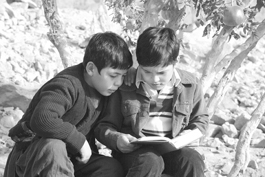home | metro santa cruz index | movies | current reviews | film review

Photograph by Phil Bray
Friends: Ahmad Khan Mahmoodzada (left) and Zekiria Ebrahimi bond as children in 'The Kite Runner.'
Kabul, Kabul
'The Kite Runner' fails to soar on the big screen.
By Richard von Busack
Since The Kite Runner is derived from a popular novel by Fremont-based author Khaled Hosseini, fans will be pleased that the film is faithful to its source. Similarly, those who couldn't make it past the first 100 pages of the book will know what to dread. Adapter David Benioff sands some of the corners off the narrative, but the polishing somehow makes it worse. The action begins in 2000, right before America assembled the roster of nations that invaded Afghanistan. After publishing a novel titled A Season of Ashes (sounds good for the soul, doesn't it?), San Francisco writer Amir (Khalid Abdalla) receives an urgent call from his native country. This initiates a series of flashbacks to the childhood of the young Amir (Zekeria Ebrahimi), spent in the company of his servant's son, Hassan (Ahmad Khan Mahmoodzada), a member of a despised minority. Despite the fact that his mother is dead, Amir's childhood is in some respects carefree. The highlight of the year comes in a fighting-kite competition. Despite his good performance in event, the poetic, shy side of the boy Amir bothers his father: "Something is missing in him," claims the elder man. That missing something is revealed when Hassan is bullied savagely. Amir hides from the fight. A bill will come due for this moment of childhood cowardice, but it won't be paid until decades later, after the Russians invade. In Fremont, Amir grows up under the guidance of his stern, loving father, who runs a gas station. Amir marries and becomes a published writer. But then he receives news from Central Asia, and he's forced by duty to don a turban and false beard and travel to the center of a fundamentalist nightmare.
The highly mediocre director Marc Forster (he's doing Bond 22, I'm sorry to say) shows his gift for cooling off hot-potato material just enough to sell it. Scenes of the raping of a little boy or the decapitation of a sheep are handled with the poise of a smooth waiter removing an offensive dirty dish. I once read an idiot on Craigslist defending the practice of stoning as a superior form of execution. According to the correspondent, this was unusually pain-free method of killing. A specialist—a sort of relief pitcher—is brought in to hurl the first killing rock. From the way Forster stages the stoning of an adulteress in a Kabul sports arena, you would have to agree with the Craigslist maniac. Even in the most horrific scenes, there's a constantly antiseptic quality to Forster's direction.
The leaden subtitled dialogue ("Flowers will bloom in the streets of Kabul again"), and Abdalla's recessive, damp performance are only parts of the problem. The Kite Runner represents film-factory work, and once upon a time Forster would have been at home among the MGM-style emasculators of the classics. The sad part is that The Kite Runner is almost a family film—if you cut a few more details about rapacious villains, it could be sold as a somewhat stodgy kid-friendly film. And then the film's essential boredom would hardly be worth commenting upon.
![]() THE KITE RUNNER (PG-13; 122 min.), directed by Marc Forster, written by David Benioff, based on the novel by Khaled Hosseini, photographed by Roberto Schaefer and starring Khalid Abdalla, Zekeria Ebrahimi and Ahmad Khan Mahmoodzada, opens Friday at Riverfront Twin in Santa Cruz.
THE KITE RUNNER (PG-13; 122 min.), directed by Marc Forster, written by David Benioff, based on the novel by Khaled Hosseini, photographed by Roberto Schaefer and starring Khalid Abdalla, Zekeria Ebrahimi and Ahmad Khan Mahmoodzada, opens Friday at Riverfront Twin in Santa Cruz.
Send a letter to the editor about this story.
|
|
|
|
|
|